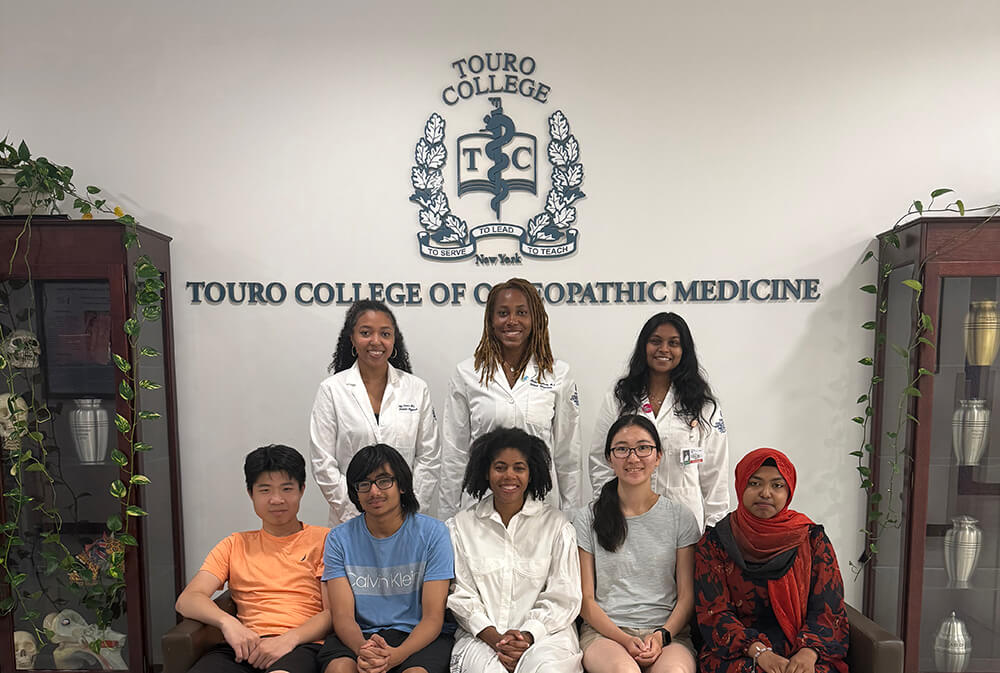Summer in the Lab Leads to Breakthroughs for High School Students
At TouroCOM Harlem’s New MedAchieve Research Program, Local Teens Learn Research Skills Studying Asthma, Herbal Medicine, and Food Access with DO Student Mentors

Instead of socializing with friends or focusing on personal hobbies this past summer, four New York City high school students experimented with fruit flies and aloe plants; researched genetic coding of herbal medicines; and did zip code mapping of bodegas – all part of a new STEM research program at Touro College of Osteopathic Medicine (TouroCOM) in Harlem, MedAchieve III.
The students are all graduates of TouroCOM’s MedAchieve I and II, a successful two-year STEM program that empowers high school students to become physicians and healthcare providers through mentoring and academic enrichment in the sciences.
The eight-week pilot launch of MedAchieve III focused on introducing research skills and knowledge building; conducting needs assessments in Harlem; literature reviews; developing topics and hypotheses; collecting and analyzing data; and presenting results.
Important Growth Phase
“This newest addition to MedAchieve represents a very important growth phase. I am excited about building upon this pathway into medicine or other careers in science and what that will mean for future students,” said Dean of Student Affairs and Clinical Associate Professor Dr. Nadege Dady.
The students worked on campus one-on-one with DO student mentors in a lab and attended weekly seminars with scientists who shared their own research and paths to science. Seminar topics included chemical engineering, primatology and parasitology, neuroscience, cardiology, biochemistry and virology.
“Early exposure to science is helpful when applying to college and pursuing a career in science, especially for individuals from underresourced areas,” said TouroCOM Associate Professor, Pharmacology and Director of Community Affairs Dr. Kamilah Ali, who developed MedAchieve III out of her own love for research.
Among the local organizations supporting the course were BioBus, which works with youth in underserved areas to learn about science; God’s Love We Deliver; Pillars; Perinatal Partnership of Manhattan; and Maria Solá Green Space, in the Bronx.
Mentored by Touro Medical Students
The high school students were mentored by three TouroCOM DO medical students—Nya Evans, Alexa Wallace and Gabrielle Singh—who helped them develop feasible projects based on the needs of the Harlem community.
Jack Cao, a rising senior at Stuyvesant High School, researched the effects of particulate matter (PM) pollution known to cause and worsen respiratory diseases like asthma and cardiovascular disease. Using fruit flies, his study aimed to analyze the effects of PM on development. Cao reported that exposure to the fine particles can severely delay the life cycle and reduce successful hatching to adults.
“I wanted to work on a project that would have relevance in a community when it comes to environmental challenges,” said Cao. “Working with the flies, it’s pretty evident depending on exposure, there can be severe consequences. For the group exposed the longest, the impact was dramatic. They didn’t grow beyond the larval stage.”
Aloe Plants to Genetic Coding of Herbal Products to Impact of Gentrification
Abigail Hua, a recent graduate of Fiorello La Guardia High School who recently matriculated at Smith College, studied soil pH and its effect on the growth and survival of aloe vera plants.
“Aloe vera is the perfect plant to reverse the negative effects the environment brings to Harlem,” wrote Hua in her research proposal. “This issue is especially important in central Harlem because there is a high percentage of people living in Harlem that have symptoms of asthma. Although aloe vera cannot cure asthma, it can help provide relief.”
Anika Haque, a senior at Manhattan Center for Science and Mathematics (MCSM) in East Harlem, researched genetic coding and barcoding of herbal medicines (red ginseng and Astragalus membraneceus) from distributors to help people determine whether the herbal products they buy online are pure and authentic.
Raiyan Hasnaen, also a senior at MCSM, used zip code mapping to examine the impact of gentrification and the accompanying loss of supermarkets and healthy retail food outlets on Type 2 diabetes risk in low-income urban neighborhoods – specifically East Harlem.
The students all said they found the summer program worthwhile, highlighting the seminar presentations and opportunities to interact with working scientists.
Cao, who plans to major in biology in college and aim for medicine, said the program was one of the most meaningful projects he’s been a part of. “One thing that really stuck with me is how careful and meticulous you have to be. It made me more motivated to pursue a career in science.”

